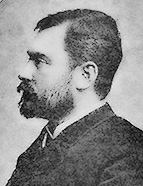

An attentive observer of national and international affairs from a young age—evidenced by his contributions to República in 1870 and the journal Ocidental in 1875—Oliveira Martins deepened his engagement with periodical journalism by founding A Província [The Province] (1885–1887) in Porto and, later, O Repórter [The Reporter] (1888) in Lisbon. In addition to these diverse professional experiences, Martins, convinced of the need for profound political reform in Portugal, joined the Partido Progressista [Progressive Party] in 1885. Within the party, he led the faction known as Vida Nova [New Life], supporting Anselmo Braamcamp, whom he greatly admired (see Política e economia nacional [Politics and National Economy], 1885). Oliveira Martins became one of the most coherent and profound critics of the politics of Fontes Pereira de Melo. He saw Melo as the personification of a “bureaucratic oligarchy” disconnected from the realities of the country, whose practices of clientelism and caciquismo (bossism) had, in his view, encouraged republicanism ( A Província , III, 428–432). However, upon Melo’s death, Martins acknowledged the political leader’s character and qualities.
In the political sphere, it is noteworthy how Oliveira Martins’s engagement with Portuguese society was judged so differently by his contemporaries. He did, in fact, accept support from the Regeneradores [Regenerators] as an independent candidate for MP (1878). Similarly, he would agree to stand as the official candidate of the Partido dos Operários Socialistas de Portugal [Portuguese Workers' Socialist Party] in the 1879 elections. His reformist intentions were also evident when he joined the Partido Progressista in 1885. He was elected as an MP (serving continuously from 1886 to 1894) and, in 1892, was appointed Minister of Finance in José Dias Ferreira’s ministry. However, he held this position for only four months due to disagreements with the prime minister, who withdrew his support. His trajectory drew heavy criticism at the time, particularly from republicans, however, it must be understood in light of Oliveira Martins’s own assessment of the deficiencies of national political life, especially the relationship between the political elite and civil society. His perspective must also be considered within the framework of his independent, suprapartisan reformist project, which downplayed the formal issue of the regime—a stance he shared with Antero de Quental. His adherence to socialismo catedrático [academic socialism], his critique of the prevailing system of electoral representation, and his condemnation of the oligarchic nature of parliamentary rule led him, as early as 1879, to propose an organicist model of political representation. This proposal aimed to counter the statu quo , which, in his view, fostered caciquismo and clientelism ( As eleições [ Elections ], 1879; see Fernando Catroga, “O problema político…” ["The Political Problem … "], 1981). His suggestions for an extraordinary dictatorship, the strengthening of state power (evident in the "Explicações" ["Explanations"] to the second edition of Portugal Contemporâneo [Contemporary Portugal], 1883), his alignment with the young King D. Carlos, and his inspiration in Caesarism did not yield the desired results as the financial and political crisis intensified in the years 1890–92.
This work is financed by national funds through FCT - Foundation for Science and Technology, I.P, in the scope of the projects UIDB/04311/2020 and UIDP/04311/2020.
